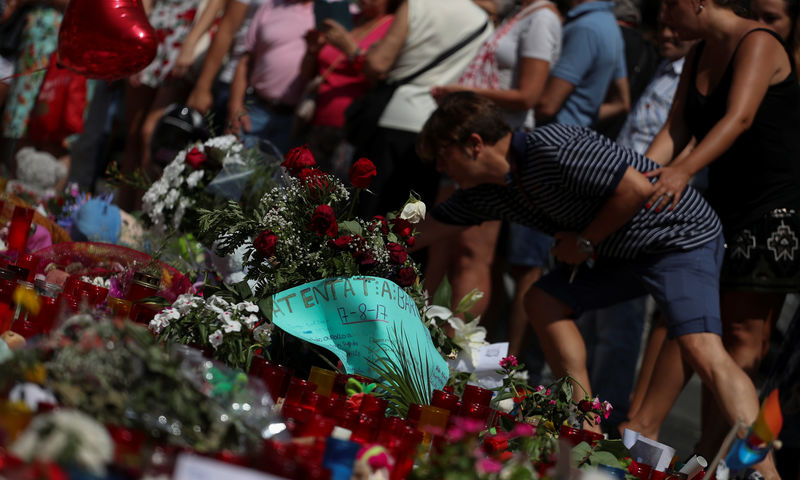By Angus Berwick
BARCELONA, Spain (Reuters) - Spain asked the rest of Europe to join the hunt for a young man thought to have been the driver in last week's deadly van attack in Barcelona as police said on Monday that he had also hijacked a car and killed its occupant during his escape.
After driving at high speed into crowds on the city's famous avenue Las Ramblas last Thursday, killing 13 people, the suspected Islamist militant fled on foot and then hijacked the car as it was being parked, stabbing the driver to death, police said.
The suspect, Moroccan-born Younes Abouyaaqoub, 22, then drove the hijacked car through a police checkpoint, police said. It was later found abandoned, with the man's body inside.
Spanish magistrates have sought a Europe-wide arrest warrant for Abouyaaqoub, a judicial source said. Police say he may have crossed the border into France, amid fragments of evidence that appear to link the Barcelona attack's plotters to the country.
"We have no evidence that he crossed the border, we don't think it would have been easy but we cannot rule out that he didn't cross any border," Josep Lluis Trapero, head of regional police in Catalonia, told a news conference.
Abouyaaqoub is the only one of 12 men who is still at large. His mother, Hannou Ghanimi, appealed at the weekend for her son to give himself, saying she would rather see him in prison than end up dead.
Four people have been arrested so far in connection with the attacks: three Moroccans and a citizen of Spain's North African enclave of Melilla. They will be taken to the high court in Madrid, which has jurisdiction over terrorism matters
Abouyaaqoub lived in Ripoll, a town north of Barcelona, close to French border.
Islamic State claimed responsibility for the Barcelona attack as well as a separate deadly attack hours later in the coastal resort town of Cambrils, south of Barcelona.
In Cambrils, a car crashed into passers-by and its occupants got out and tried to stab people. Five suspects were shot dead, while a Spanish woman died in the attack.
In the roughly seven hours of violence that followed the van's entry into the pedestrian boulevard of Las Ramblas on Thursday afternoon, attackers killed 15 people: 13 on Las Ramblas, the Cambrils victim and the man in the hijacked car.
Of the 120 injured on Las Ramblas, nine are still in a critical condition in hospital.
Another two suspected plotters, including an imam thought by police to have helped radicalize his young conspirators, were killed late on Wednesday night, hours before the attacks began, in what is believed to have been an accidental explosion.
Police chief Trapero said there was now "solid evidence" that the imam, Abdelbaki Es Satty, was killed in the blast at a house in the town of Alcanar, south of Barcelona.
About 120 butane gas cylinders were found there. Police believe the pair was preparing a much larger attack with explosives, but the blast prompted the other militants to adopt a new, less elaborate plan.
Abouyaaqoub began showing more religiously conservative behavior within the past year, according to family members in his native Morocco. He refused to shake hands with women during a visit to his birthplace in March, they said.
Abouyaaqoub's brother El Houssaine and first cousins Mohamed and Omar Hychami were among those killed by police in Cambrils. They were all originally from the small Moroccan town of Mrirt.
Authorities have stepped up checks at Spain's borders and also raided more homes overnight in Ripoll, a town close to France where many of the suspects in the 12-strong cell had lived.
Spanish political leaders from all the main parties met on Monday to review security measures as part of cross-party efforts to unite on anti-terrorist efforts, though no immediate decision was taken at the meeting.

For a graphic on the van attack, click: http://fingfx.thomsonreuters.com/gfx/rngs/SPAIN-BARCELONA-%20/010050G9127/index.html